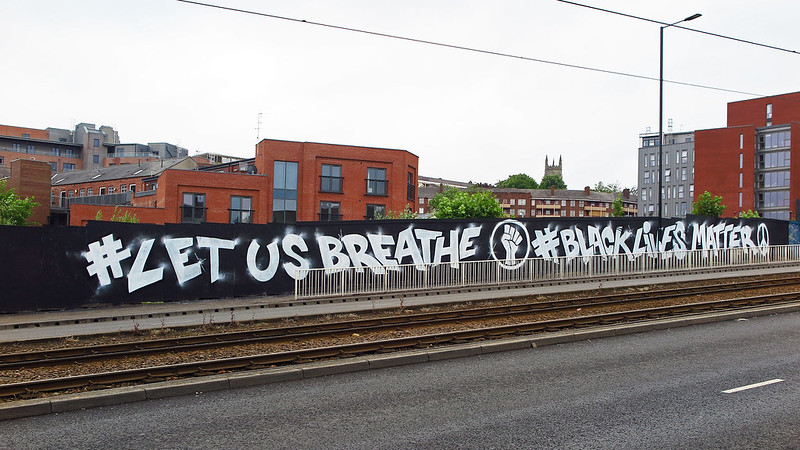Britain’s policing of Black Lives Matter protests was ‘institutionally racist’, according to a damning new report from a police watchdog group published today. The report by Network for Police Monitoring (Netpol) examined the policing of the protests in the aftermath of the killing of George Floyd in America in multiple demonstrations in the UK between May and August this year.
The group gathered evidence from over 100 witnesses, including protesters, legal observers and arrestee support volunteers, and uncovered evidence of British police officers using excessive force, failing in their duty of care and racial discrimination.
Concerns included excessive use of force with a disproportionate targeting of black protesters; kettling and enclosing large numbers of protesters indiscriminately in confined spaces for up to eight hours, including children and potentially vulnerable persons with no access to toilets, food or water, and making social distancing impossible despite the government’s guidance that socially distancing was imperative in the pandemic; and a clear neglect by police officers of BLM protesters that experienced violence from far-right organized counter-demonstrators.
‘When taken case-by-case, the evidence in this report suggests racially discriminatory policing, but when viewed collectively, there can be little doubt that policing in Britain still has a serious problem with institutional racism,’ commented Dr Adam Elliott-Cooper, an academic and co-author of the report.
The Netpol report follows a similarly critical report by Parliament’s Joint Committee on Human Rights, published yesterday titled called Black people, Racism and Human Rights which stated that more than three quarters of black people in the UK (75%) do not believed their human rights are equally protected compared to white people and more than eight of 10 (85%) do not believe that they would be treated the same as a white person by the police.
The joint committee made it clear that the government commissioning reports and failing to implement the recommendations intensifies disaffection and lack of confidence in the government on race issues. The government has established the Commission on Race and Ethnic Disparities – the Commission is expected to report before the end of 2020. ‘The focus of this new Commission must not be further fact-finding but on taking action to reduce inequalities and secure Black people’s human rights,’ it said.
The committee called for the recommendations from the 2017 Lammy Review in race and the criminal justice system to be implemented as a matter of priority and for the police to regularly poll black people to find out their levels of confidence in the police to protect their human rights and to use findings to to set a benchmark to increase the confidence in the police. It also called on the government to fulfill its promise to implement the recommendations from the Windrush review as a matter of urgency.
Today’s Netpol report questions the motivations for the restrictive responses to many Black Lives Matter protests and challenges what the group calls the ‘stereotypical and racist characterisation of protestors, including by the Home Secretary Priti Patel, as “thugs and criminals”’.
Netpol argues that ‘racism affected the manner in which police enforced lockdown regulations and responded’ to the Matter protests and that the policing was ‘institutionally racist’. ‘The police have a legal duty to facilitate the public’s right to protest,’ Netpol argues. ‘Their failure to do so has the effect of eroding the legal democratic rights enshrined in Article 11 of the European Convention of Human Rights, the right to freedom of assembly and association.’
Dr Elliott-Cooper called it ‘a bitter irony’ that protests against racism in policing were ‘themselves sites of disproportionate use of force and discriminatory practices’. The report argues that the evidence of the report makes it clear that ‘police cannot and should not be tasked with managing protests of this nature, and have put the right to freedom of assembly at risk’. ‘We call for an alternative model which engages non-police organisations to manage protests in future,’ it says.
The full Netpol report can be found (here) and the Joint Committee report can be found (here).




